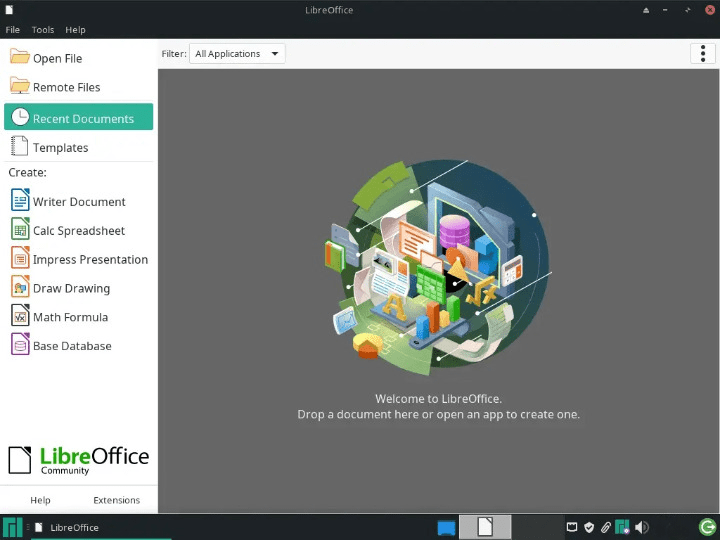How To Install LibreOffice on Linux Mint 22

In this tutorial, we will show you how to install LibreOffice on Linux Mint 22. LibreOffice is a powerful, free, and open-source office suite that offers a viable alternative to proprietary software like Microsoft Office. It includes applications for word processing, creating and editing spreadsheets, slideshows, diagrams, and more.
This article assumes you have at least basic knowledge of Linux, know how to use the shell, and most importantly, you host your site on your own VPS. The installation is quite simple and assumes you are running in the root account, if not you may need to add ‘sudo‘ to the commands to get root privileges. I will show you the step-by-step installation of LibreOffice on Linux Mint 22.
Prerequisites
- A server running one of the following operating systems: Linux Mint 22.
- It’s recommended that you use a fresh OS install to prevent any potential issues.
- While we’ll guide you through the process, a basic understanding of the command line will be beneficial. If you’re new to the CLI, you might want to acquaint yourself with some fundamental commands.
- A stable internet connection for downloading packages.
- Administrative privileges are essential for installing and configuring software on your system. Ensure that you have superuser or sudo access.
Install LibreOffice on Linux Mint 22
Step 1. Update Your Linux Mint System.
Before installing any new software, it’s good practice to update your system’s package index. Open a terminal and run the following command:
sudo apt update sudo apt upgrade
This command refreshes the list of available packages and their versions, ensuring you have the most up-to-date information.
Step 2. Installing LibreOffice.
- Method 1: Using the PPA (Personal Package Archive)
For users who want more control over their LibreOffice installation and access to the latest versions, using a PPA is an excellent option. This method requires some comfort with using the terminal.
Open a terminal window and enter the following command:
sudo add-apt-repository ppa:libreoffice/ppa
After adding the PPA, update your system’s package list:
sudo apt update
Now, install LibreOffice using the following command:
sudo apt install libreoffice
Once the installation is finished, you can launch LibreOffice from the Linux Mint menu or by searching for it in the application launcher.
- Method 2: Manual Installation from LibreOffice Website
For users who want the absolute latest version or need a specific version of LibreOffice, manual installation from the official website is the way to go. This method gives you the most control but requires more steps.
Navigate to the LibreOffice download page website and select the DEB package for Linux.
Next, open a terminal and navigate to your Downloads folder, then run:
tar -xzvf LibreOffice_*.tar.gz
Navigate to the extracted folder and install the packages:
cd LibreOffice_*/DEBS sudo dpkg -i *.deb
If you downloaded language or help packs, install them similarly:
sudo dpkg -i *.deb
Once the installation is complete, you can launch LibreOffice from the Linux Mint menu or by searching for it in the application launcher.
Manual installation provides flexibility in terms of choosing a specific version of LibreOffice and having full control over the installation process. However, it requires more technical knowledge and comfort with using the terminal.
- Method 3: Using Flatpak
Flatpak is a universal package management system that allows for easy installation of applications across different Linux distributions. It’s a good option for users who want a containerized installation of LibreOffice.
If Flatpak is not already installed on your system, install it with:
sudo apt install flatpak
Add the Flathub repository, which hosts many Flatpak applications:
sudo flatpak remote-add --if-not-exists flathub https://flathub.org/repo/flathub.flatpakrepo
Install LibreOffice with the following command:
sudo flatpak install flathub org.libreoffice.LibreOffice
Once the installation is complete, you can launch LibreOffice from the Linux Mint menu or by searching for it in the application launcher.
Flatpak provides a sandboxed environment for applications, ensuring better security and isolation from the host system. It also allows you to install multiple versions of LibreOffice side by side. However, Flatpak packages may consume more disk space compared to traditional installation methods.
- Method 4: Using the Software Manager
The Software Manager is a user-friendly graphical tool that simplifies the process of installing applications on Linux Mint 22. To install LibreOffice using the Software Manager, follow these steps:
-
- Open the Software Manager by clicking on the Linux Mint menu and selecting “Software Manager” from the list of applications.
- In the search bar located at the top-right corner of the Software Manager window, type “LibreOffice” and press Enter.
- From the search results, select the LibreOffice package and click on the “Install” button.
- Enter your password when prompted to authorize the installation process.
- Wait for the installation to complete. The Software Manager will handle the download and installation of LibreOffice and its dependencies.
- Once the installation is finished, you can launch LibreOffice from the Linux Mint menu or by searching for it in the application launcher.

The main advantage of using the Software Manager is its simplicity and ease of use. It is an ideal method for beginners who prefer a graphical interface and want to avoid using the terminal. However, the version of LibreOffice available in the Software Manager may not always be the latest release, as it depends on the repositories maintained by Linux Mint.
Congratulations! You have successfully installed LibreOffice. Thanks for using this tutorial to install the latest version of LibreOffice on the Linux Mint system. For additional help or useful information, we recommend you check the official LibreOffice website.